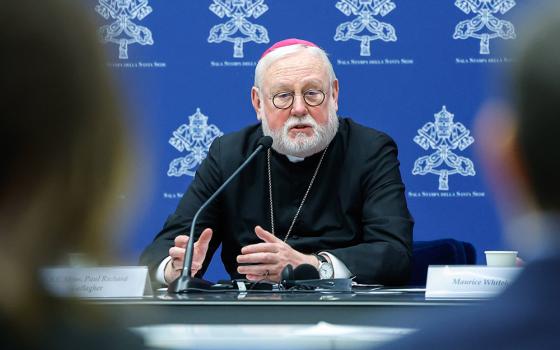 Since St. Joseph Sr. Elizabeth A. Johnson grabbed the attention of Catholics worldwide with her acclaimed book She Who Is 15 years ago, she has continued to stake out new scholarly ground in her subsequent works.
Since St. Joseph Sr. Elizabeth A. Johnson grabbed the attention of Catholics worldwide with her acclaimed book She Who Is 15 years ago, she has continued to stake out new scholarly ground in her subsequent works.
Her latest book, Quest for the Living God: Mapping Frontiers in the Theology of God, though aimed at a general audience, continues to push boundaries outward as she maintains her decades-long passion to explain the Christian triune God.
“I would not be at all adverse if we simply dropped the word Trinity altogether,” she said in a telephone interview recently. “I say that because when you say Trinity to people, their eyes glaze over. In a simple way, people get the imagination of three people or three separate persons, or ‘two men and a bird,’ as Sandra Schneiders puts it. I prefer ‘Triune God.’ It’s still one God, but a living God -- Creator, Jesus and Spirit.”
Johnson, a distinguished professor of theology at Fordham University in New York, one of four faculty members so named at the university, says she prefers the designation Spirit, Jesus and Creator to emphasize the dynamic role the Spirit plays in history and how the Spirit is intimately involved in every aspect of our lives.
Words matter, she explains. How we envision God affects how we view existence and how we interpret life.
The notion of a triune God, rather than a distant or judging God, served initially as the foundation upon which Elizabeth Johnson constructed a feminist interpretation of God in She Who Is in 1993. Similarly, it served as the underpinning of her interpretation of the communion of saints in Friends of God and Prophets, published in 1999. It helped forge her ideas of Mary in Truly Our Sister in 2003. And it is the cornerstone of Quest for the Living God, wherein the author explores Christian experiences of God, arguing that the world itself, in all of its beauty, becomes a clue to the Creator. She writes about the experiences of women, of the poor in Latin America, of African-Americans coming out of slavery, of Hispanics, of Christians in India.
“All of these experiences have raised in people’s minds a new sense of who the living God is,” she said.
As a woman theologian in an academy dominated by men, Sr. Johnson says she feels a special responsibility. “I do theology as a woman, and that is not to be taken for granted,” she noted.
Since She Who Is was published, Sr. Johnson has been branded a “feminist” theologian. She has mixed feelings about this, she said. “I feel fine about the label if it’s friendly,” she said. “If it’s dismissive, well, then, no. It doesn’t exhaust what I do.”
A native of Brooklyn, N.Y., Elizabeth Johnson entered college and religious life, the Congregation of St. Joseph, Brentwood, N.Y., in 1959. She attended the order’s Brentwood College on Long Island, which has since closed. At her order’s request, she became a science teacher in Catholic schools, from second grade through high school and college. Then she switched tracks and pursued higher education. In 1981, she became the first woman to get a Ph.D. in theology from The Catholic University of America. There she taught on the school’s pontifical faculty from 1981 to 1991 before moving to Fordham.
Sr. Johnson, 66, is today one of Catholicism’s most highly regarded theologians. A past president of the Catholic Theological Society of America, she has received numerous awards for her work.
According to Sr. Johnson, people everywhere are longing for mature theology. She finds it slow in coming.
“There is a widespread hunger, and, unfortunately, it’s a hunger that isn’t often met. Preaching needs to be reformed -- our own bishops say that.”
In part, it’s responding to this hunger that moved her to write Quest for the Living God.
“I just wanted a book out there, a simple book that people could pick up and read and munch on and feast on and have a banquet in terms of what’s going on in the theology of God,” she said.
[Tom Fox is a former NCR editor and publisher.]
Editor's Note: Listen to a podcast conversation between NCR editor Tom Fox and Sr. Johnson: Elizabeth Johnson and The Quest for the Living God.




